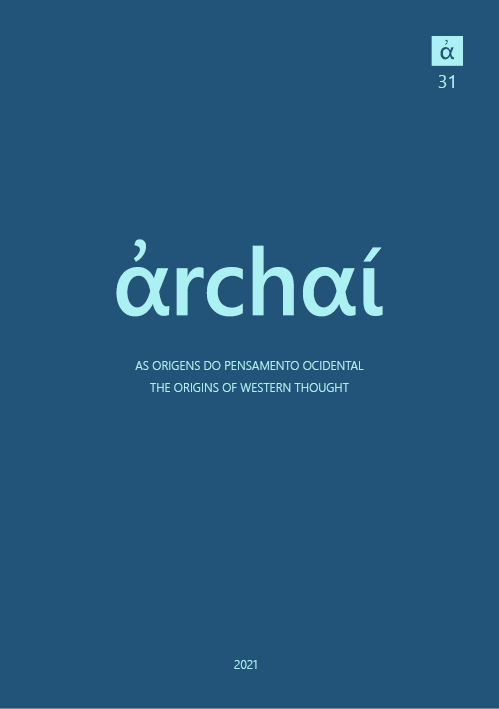Establishing the Logos of Melissus: A Note on Chapter 1, Hippocrates’ De natura hominis
DOI:
https://doi.org/10.14195/1984-249X_31_24Palavras-chave:
Melissus, Hippocrates, Monism, EleaticsResumo
The earliest mention of Melissus of Samos by name is found in the first chapter of the Hippocratic De natura hominis. In the following note, I attempt to examine what is meant by the reference Melissus’ ‘logos’ in this work and suggest, against previous accounts, including Galen’s, that it has little to do with his commitment to monism. Rather Melissus’ logos is better understood as his referring to his strategy for demonstrating such a conclusion, especially his use of a supplemental argument in his fragment B8. Polybus’ concern in this first chapter is not monism as such but the claims to knowledge monists make. Melissus is a prime example of a monist who fails to grasp what he claims to know.Downloads
Referências
BARNES, J. (1982). The Presocratic Philosophers. London, Routledge
BICKNELL, P. (1982). Melissus’ way of seeming? Phronesis 27, p. 194–201.
BURY, R.G. (1935) Sextus Empiricus. Sextus Empiricus, Against the Logicians. Cambridge, MA, Harvard University Press.
FURLEY, D. (1967) Two Studies in the Greek Atomists. Princeton, Princeton University Press.
GUTHRIE, W. K. C. (1965). A History of Greek Philosophy. Volume II. Cambridge, Cambridge University Press.
GRAHAM, D. W. (2010). The Texts of Early Greek Philosophy. Cambridge, Cambridge University Press.
HANKINSON, R. J. (1998) Cause and Explanation in Greek Thought. Oxford, Clarendon Press.
HARRIMAN, B. (2015). The Beginning of Melissus’ On Nature, or On What-is: A Reconstruction. Journal of Hellenic Studies 135, p. 19–34.
HARRIMAN, B. (2018) Melissus and Eleatic Monism. Cambridge, Cambridge University Press.
JONES, W. H. S. (1923). Hippocrates. Volume II. Cambridge, MA, Harvard University Press.
JOUANNA, J. (1965). Rapports entre Mélissos de Samos et Diogène d’Apollonie, à la lumière du traité hippocratique De natura hominis. Revue des Études Anciennes 67, p.306–23.
JOUANNA, J. (2012). The Legacy of the Hippocratic Treatise The Nature of Man: The Theory of the Four Humours. In: ALLIES, N. (ed.) Greek Medicine from Hippocrates to Galen: Selected Papers. Leiden, Brill, p. 335-360.
LONGRIGG, J. (1993). Greek Rational Medicine: Philosophy and Medicine from Alcmaeon to the Alexandrians. London, Routledge.
MAKIN, S. (2014). Parmenides, Zeno, and Melissus. In: WARREN, J.; SHEFFIELD, F. (eds.) The Routledge Companion to Ancient Philosophy. London, Routledge, p. 34–48.
MANN, J. (2012). Hippocrates, On the Art of Medicine. Leiden, Brill.
MEWALDT, J.; HELMREICH, G.; WESTENBERGER, J. (1914). Corpus Medicorum Graecorum, V. 9, 1. Galeni in Hippocratis de Natura Hominis, in Hipporatis de Victu Acutorum, de Diaeta Hippocratis in Morbis Acutis. Berlin, B.G. Teubner.
PALMER, J. (2001). A New Testimonium on Diogenes of Apollonia, with Remarks on Melissus’ Cosmology. Classical Quarterly 51, p. 7-17.
PALMER, J. (2004). Melissus and Parmenides. Oxford Studies in Ancient Philosophy 26, p. 19–54.
PALMER, J. (2009). Parmenides and Presocratic Philosophy. Oxford, Oxford University Press.
REALE, G. (1970). Melisso: Testimonianze e frammenti. Florence, La Nuova Italia.
REINHARDT, K. (1916). Parmenides und die Geschichte der griechischen Philosophie. Bonn, Friedrich Cohen.
TAYLOR, A.E. (1911). Varia Socratica. Oxford, J. Parker.
Downloads
Publicado
Como Citar
Edição
Seção
Licença
Copyright (c) 2021 Benjamin Harriman

Este trabalho está licenciado sob uma licença Creative Commons Attribution 4.0 International License.
Dado o acesso público desta revista, os textos são de uso gratuito, com obrigatoriedade de reconhecimento da autoria original e da publicação inicial nesta revista. O conteúdo das publicações é de total e exclusiva responsabilidade dos autores.
1. Os autores autorizam a publicação do artigo na revista.
2. Os autores garantem que a contribuição é original, responsabilizando-se inteiramente por seu conteúdo em caso de eventual impugnação por parte de terceiros.
3. Os autores garantem que a contribuição que não está em processo de avaliação em outras revistas.
4. Os autores mantêm os direitos autorais e concedem à revista o direito de primeira publicação, sendo o trabalho licenciado sob a Creative Commons Attribution License-BY.
5. Os autores têm permissão e são estimulados a publicar e distribuir seu trabalho on-line após a publicação na revista.
6. Os autores dos trabalhos aprovados autorizam a revista a, após a publicação, ceder seu conteúdo para reprodução em indexadores de conteúdo, bibliotecas virtuais e similares.
7. É reservado aos editores o direito de proceder ajustes textuais e de adequação do artigo às normas da publicação.



